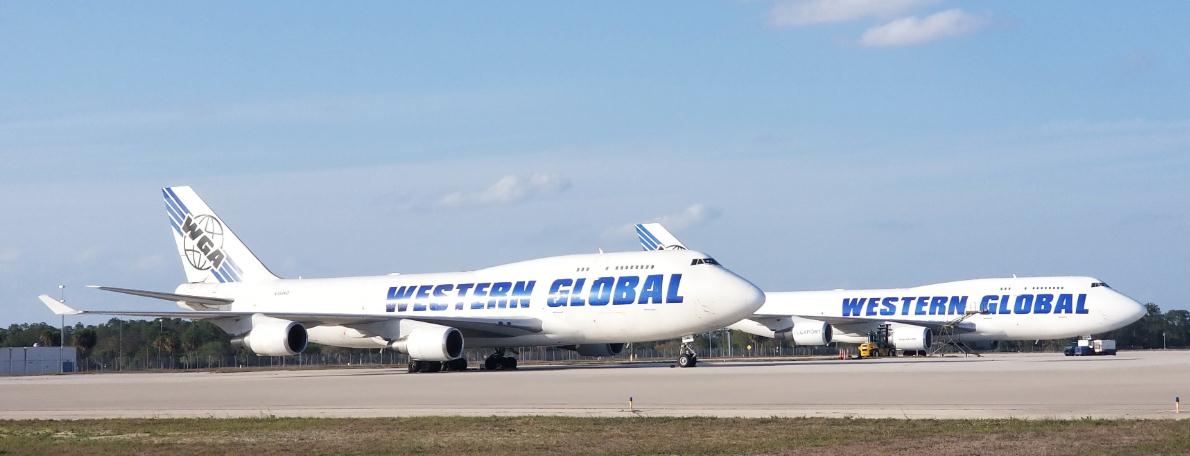Forwarder Flexport continues to build out its footprint and capacity as well as the technology around which its business is built. With a fresh infusion of funding of US$1 billion, the company has the clout and the backing to keep up its momentum.
Flexport’s physical presence grew in January, when it added Chicago to its dedicated freighter operation with a weekly service from Hong Kong via Los Angeles. Previously the exclusive all-cargo activity consisted of a twice-weekly freighter run from Hong Kong to Los Angeles with a Boeing 747-400 cargo aircraft leased from Western Global Airlines under a three-year contract signed last year.
The Chicago flight got under way in a market visibly in retreat from the buoyant demand that characterized the latter half of 2017 and most of 2018. Since the Lunar New Year break the going has been slow, acknowledged Neel Jones Shah, senior vice president for global air freight.
“It’s been an incredibly slow start,” he said, adding that volumes dropped by a double-digit rate and yields fell even further.
He attributed this to the large build-up of inventory in 2018, as importers stocked up to beat the March 31 deadline for a possible increase in tariffs on imports from China by the Trump administration, and to the uncertainty over conditions for global trade this year.
Shah hopes for a stronger market going forward as prospects for an agreement between the US and China improve and companies become more confident about global trade again.
He also sees good growth prospects for Vietnam this year, regardless of how trade relations between China and the US develop.

Down the road he does expect to see a downturn though – perhaps in 2019, perhaps in 2020. He pointed to recent economic data from Germany as well as China and some indicators in the US. “A lot of data suggests that the global economy is slowing down,” he said.
Either way, Flexport has a strong financial position to move forward. In late February it secured a whopping US$1 billion in funding. This was led by SoftBank Vision Fund, supplemented by several existing investors. Among them was SF Express, which had earlier invested US$100 million in the US forwarder.
Evidently these backers are convinced of the technology-based firm’s potential to shake up the market and gain business. For last year, Flexport reported top-line revenues of almost US$500 million.
Announcing the agreement, Flexport management declared that the money would be used “to deepen its technology and data capabilities, grow its global logistics infrastructure footprint, and invest in industry expertise to help clients navigate increasingly complex global trade environments.”
Besides securing dedicated lift, Flexport has taken on warehousing in strategic locations, and this will continue, Shah said. The company’s 120,000-sq-ft Chicago gateway was due to open in late March. It is the first Flexport location outside its San Francisco home where the company is establishing a technology and engineering presence.
Other locations will follow. “We look at Atlanta, JFK, Amsterdam and places like that,” Shah said.
While management wants to expands its reach, the strategic focus will remain on the trans-Pacific market. “You can’t be all things to all people. You have to have a geographic focus,” he said. Expeditors International rose to prominence on its expertise in the trans-Pacific trade and only later expanded seriously into other areas, he noted.
Nevertheless, there is going to be some expansion elsewhere. “You will see a lot more trans-Atlantic business, and a lot more US exports from us this year,” he said. In percentage terms these areas should see significant growth, albeit from a small base, he added.
Regarding the planned investment in expertise, Shah said that this will take many forms – from recruiting qualified people to acquiring companies that have niche technology and capabilities that Flexport finds valuable. Over time the company will build up expertise in special market segments, but there are no plans to target specific verticals for the time being.
As for further investment in technology, Shah said that the overall investment Flexport has made so far in its platform has paid dividends, particularly in regard to small and mid-sized shippers. “It basically gives them the ability to replace their internal system,” he stated.
By Ian Putzger
Air Freight Correspondent | Toronto



